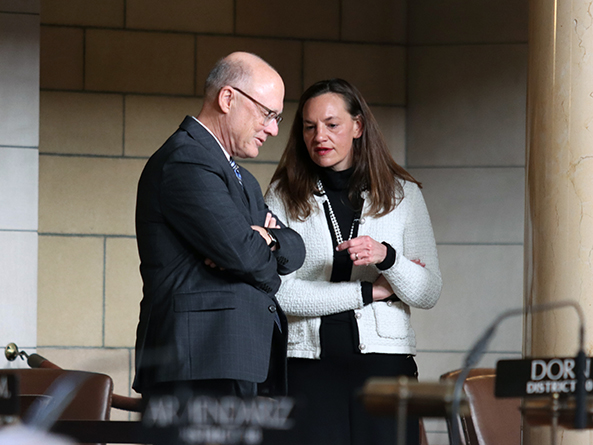Legislative rules debate begins, two changes adopted
Lawmakers began discussion Jan. 11 on several proposed changes to the permanent rules that govern the legislative process.
The Rules Committee heard testimony on 34 suggested changes earlier in the week and forwarded 16 proposals to the floor for consideration. Lawmakers started debate with five proposed technical changes focused on streamlining debate and codifying existing practices.
All but one of the proposals up for initial consideration originally were brought to the committee by Speaker John Arch of La Vista. Arch described the proposals as part of an attempt to avoid the pitfalls that threatened to derail the 2023 legislative session, but said they also would help the Legislature address broader institutional reforms.
The goal, he said, is to determine the will of the majority while protecting everyone from obstructive tactics.
“Our institution was seriously tested this last session,” Arch said, “and it became apparent that there were significant opportunities to improve our processes and support systems to better address our work.”
Bayard Sen. Steve Erdman, chairperson of the Rules Committee, echoed those sentiments. Changes are needed to prevent a repeat of last session and to make the Legislature function more efficiently, he said.
“We can disagree in this body, but we don’t have to be disagreeable,” Erdman said.
Several lawmakers, including Sen. Danielle Conrad of Lincoln, used the discussion to encourage their colleagues to focus on strengthening relationships, ensuring thoughtful debate and returning to “common sense problem-solving.”
She characterized the 2023 session as “acrimonious” and out of step with the state’s political culture and history.
“Indeed, I believe it was a low-water mark for our special, unique and beloved Nebraska,” Conrad said. “So that’s the bad news. The good news is we have nowhere to go but up, together.”
Lincoln Sen. George Dungan agreed that there is a desire to return to a focus on issues such as workforce development, affordable housing and health care — but he urged caution when considering changes to the rules that govern the state’s deliberative body.
Sen. Terrell McKinney of Omaha agreed, saying lawmakers should wait to consider rule changes until next year when members have some distance from the 2023 session.
“I know last session was hard and contentious – and a lot of other things – but … that doesn’t mean we just change a bunch of rules to make it easier or to make our lives easier,” McKinney said.
The first of Arch’s proposals expands upon a temporary change made last year. Midway through the 2023 legislative session, lawmakers voted — for the remainder of that session — to allow only one of the following motions on a bill or proposal to be offered on the same day at the same stage of debate: to recommit, postpone to a specified later date or indefinitely postpone.
The three procedural maneuvers are known as “priority motions” because they take priority over amendments and automatically move the introducer of the motion to the top of the speaking queue. The tactic was used in 2023 by opponents of a measure to restrict medical care for transgender youth in an attempt to control debate.
Arch’s proposal further limits the use of priority motions to one during each stage of debate and provides that such motions may be withdrawn only with unanimous consent of the Legislature.
The change also provides an exception that allows the primary introducer of the bill, resolution or main motion under consideration to offer one additional motion to recommit or indefinitely postpone if such a motion has not previously been decided on.
Following adoption of a technical amendment, the proposed rule change was adopted on a 40-3 vote. Thirty votes were required.
A second Arch proposal, approved 35-3 following adoption of two technical amendments, expands the ability to invoke cloture — a procedure that ceases debate and forces a vote — to resolutions and motions. Cloture will not apply to consideration of changes to the rules of the Legislature.
Arch said the change means that discussion on committee reports, gubernatorial appointments, motions to withdraw a bill and other procedural items will not be subject to filibuster tactics. Currently, he said, the only way to end debate on these types of items is to vote to suspend the rules.
Lawmakers adjourned for the day before taking action on any of the other proposed rule changes.
Among the measures advanced from the committee that have yet to be considered is a proposal that would address how the required number of votes for cloture is calculated.
Currently, a cloture motion requires approval by a two-thirds majority of the 49 members of the Legislature, or 33 votes. The proposed change instead would require a two-thirds vote of the members present who are voting yes or no, with at least 25 affirmative votes.
The change would mean that members who are present in the legislative chamber but do not cast a vote would not be included in the calculus for reaching the required two-thirds majority.
Debate is expected to resume Jan. 16.


